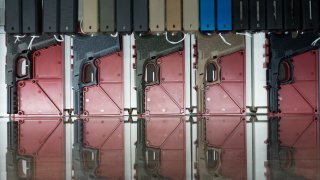
On a Saturday evening in the fall of 2020, Los Angeles County Sheriff’s Deputy Claudia Apolinar and her partner parked their police cruiser in downtown Compton with plans to keep watch over a Metro train stop. Suddenly, Apolinar heard gunshots from the passenger side of the car. Then came a warm, searing pain.
Apolinar tried to radio for help, but one of the bullets had sliced her tongue apart. Her partner, Deputy Emmanuel Perez-Perez, tried to open the passenger door to confront the shooter. But his arm was hit, and he couldn’t use his right hand.
The September 2020 ambush, detailed in a civil suit filed last year, left Apolinar and Perez-Perez with serious injuries. Three days later, police arrested the man they say carried out the attack, Deonte Murray, in connection with an unrelated carjacking. Authorities found a “ghost gun” — a firearm built from a kit anyone can buy without a background check — that they say Murray used to shoot Apolinar and Perez-Perez. (Murray pleaded not guilty to all charges in both the shooting and the carjacking. He is being held on a $6.1 million bond pending trial.)
It’s unclear from court filings how Murray got the gun. The difficulty of tracing where ghost guns come from is part of what makes them so appealing to criminals — and so concerning to law enforcement. But one thing was clear: the “P80” logo stamped at the base of its grip.
Get Tri-state area news delivered to your inbox.> Sign up for NBC New York's News Headlines newsletter.
Los Angeles has been a hot spot for ghost guns, experts say. Last year, the Los Angeles Police Department recovered 8,661 firearms. Of those, 1,921 — or more than 22 percent — were ghost guns.
And, according to data from the LAPD included in a recent court filing, 1,722 of those ghost guns — almost 90 percent — were made from kits produced by a single company: Polymer80.
Read the full story here on NBCNews.com

